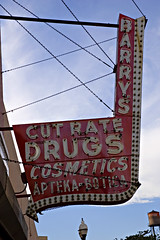The Enzyte commercials are horrible, the product is dubious, at best, but people have purchased snake-oil for as long as hawkers have peddled it.
Jim Edwards: The $100 Million Sex Pill Scandal
At 9 a.m. on March 16, 2005, about 50 armed agents from the FBI, IRS, the Food and Drug Administration and the U.S. Postal Inspection Service, all wearing helmets and bullet-proof jackets, descended on the headquarters of Berkeley Premium Nutraceuticals in Cincinnati.The agents herded the company's senior managers into separate offices away from their employees, where they were interrogated, according to Berkeley's assistant general counsel. “I was physically pushed away by a federal agent, and denied any access to anyone being questioned,” she complained to a judge later that month....
Most people have never heard of Berkeley or its controversial CEO, Steve Warshak. But many people are familiar with Berkeley's largest brand, Enzyte, which bills itself as “the once-a-day tablet for natural male enhancement.” Enzyte is promoted heavily on late-night cable TV with commercials that feature “Smiling Bob.” In the spots, Bob grins his way through golf games and pool parties while a double-entendre-laced voiceover talks about “working with wood,” and “a big new swing of confidence.” The product itself promises “fuller, firmer erections.”
Don't laugh—Enzyte and Berkeley are serious business. At its peak the company grossed almost $250 million in annual sales and had more than 1,500 employees, making it one of Cincinnati's major employers.
...
Enzyte itself is made with a mixture of 12 herbal extracts, including gingko biloba and ginseng—both commonly found in a variety of “health” drinks and neither of which have demonstrated any clinical capacity to enhance male sexual performance. Enzyte's original formulation had also included yohimbe, a West African tree bark extract that the FDA warned in 1993 could be dangerous: “Serious adverse effects, including renal failure, seizures and death, have been reported to FDA with products containing yohimbe and are currently under investigation,” the FDA said. Berkeley replaced the ingredient in 2004 with “pine bark standardized extract.”But the use of yohimbe was not the only red flag.
Initially, Berkeley's ads made extreme claims for Enzyte's powers. A December 2001 ad that ran in both Esquire and GQ said, “Over the course of the eight-month program, your erectile chambers as well as your penis, will enlarge up to 41%”—a feat that is medically impossible, said a rep for the American Urology Assn.
Warshak had a novel way of creating the ads, prosecutors say. In an e-mail to his sales vp, Warshak once gave these instructions: “Get 3-4 bottles of wine . . . then sit around and make shit up!!—That's what I do . . . but write it all down or you'll forget it the next day.” One of the things that got made up was Enzyte's Latin name, “Suffragium asotas,” which, when translated, turns out to be completely meaningless.
and apparently the industry corporate heavy hitters (Bayer, P&G, et al) are very, very interested in participating in the age-old game of parting fools and their dollars:
Tags: Advertising, /drugs, /Pharmaceuticals, /sex
What's more, authorities are not seeking to force Berkeley to close its doors. In fact, they can't—the law does not allow them to. “We have no authority to shut a business down,” said a representative of the lead federal investigator on the case. Mark Morelli, the lead lawyer on the FTC case, added, “It would be a very extreme remedy to ban a company from doing business altogether.”The reason? Berkeley is not a pharmaceutical company and Enzyte is not a drug. It's a “dietary supplement”—one of countless remedies fueling the multibillion-dollar diet, herbal and mineral supplement industry in the U.S. As such, it falls into a legal gray area created by the Dietary Supplement Health and Education Act of 1994.
The act makes it extremely difficult for the FDA to take any action as long as Berkeley's products do not outright harm its customers, and Berkeley keeps its claims about “natural male enhancement” suitably vague (in other words, refrains from making direct claims of health benefits), according to Dr. Stephen Barrett, operator of the nonprofit public-health-advocacy group QuackWatch, and an expert on the act. “The law specifically banned the FDA from prosecuting on the basis of something being an unapproved food additive unless it poses an unreasonable risk of harm,” he said. “Most of the substances involved are worthless, not harmful.”
...The dietary supplement arena—and what critics say is the lack of meaningful regulation within it—has been noticed by companies far more familiar to most Americans than Berkeley. Bayer HealthCare, Wyeth, Procter & Gamble and Coca-Cola have all launched or acquired brands that take advantage of the “well-being” claims allowed by the act.
As an industry, the dietary-supplement business was estimated by Nutrition Business Journal to be worth $22 billion last year, with growth running at 3.9%. About $1 billion was spent advertising those products, according to Nielsen Monitor-Plus.
Why would mainstream companies such as these want to get into the dietary-supplement business? With an aging population, supplements offer marketers an irresistible temptation: a growing category that is only lightly regulated by the government.
read lots more of Berkeley and Steve Warshak's shenanigans here (free registration required)

